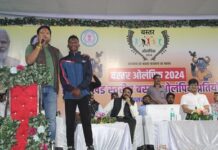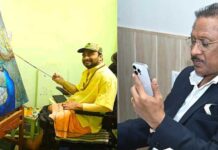U.S. President Donald Trump praised Japan as a “treasured partner” and “crucial ally” on Sunday, as he kicked off a gruelling and consequential first trip to Asia.
Mr. Trump landed at Yokota Air Base on the outskirts of Tokyo, where he was greeted by cheers from service members. Mr. Trump then donned a bomber jacket for a speech in which he touted American firepower and the U.S. alliance with Japan.
“Japan is a treasured partner and crucial ally of the United States and today we thank them for welcoming us and for decades of wonderful friendship between our two nations,” he said, speaking in front of an American flag inside an airplane hangar.
“On behalf of the United States of America, I send the warmest wishes of the America people to the citizens of this remarkable country,” he said.
After the speech, Mr. Trump was set to head to a private golf course for an informal lunch and golf with Japanese Prime Minister Shinzo Abe.
Mr. Trump was expected to exhort allies and rivals to step up efforts to counter the dangers posed by North Korea’s nuclear threat. Before he landed, Mr. Trump used the first moments of his trip to denounce North Korea as “a big problem” that must “be solved.”
“There’s been 25 years of total weakness, so we are taking a very much different approach” in dealing with the renegade regime in Pyongyang,” he said, speaking to reporters on Air Force One.
Some regional analysts have speculated that Mr. Trump’s presence in Asia may prompt North Korea to take provocative action, like a missile test. Mr. Trump, when asked about that possibility, said “we’ll soon find out.”
The 12-day, five-country trip, the longest Far East itinerary for a President in a generation, comes at a precarious moment for Mr. Trump. Just days ago, his former campaign chairman was indicted and another adviser pleaded guilty as part of an investigation into possible collusion between his 2016 campaign and Russian officials.
It will pose a test for Mr. Trump’s stamina but Mr. Trump assured reporters aboard Air Force that he was up for the task. “It’s gruelling, they tell me, but fortunately that’s historically not been a problem for me. One thing you people will say, that’s not been a problem,” he said.
It also presents a crucial international test for a President looking to reassure Asian allies worried that his inward-looking “America First” agenda could cede power in the region to China. They also are rattled by his bellicose rhetoric about North Korean leader Kim Jong-un. The North’s growing missile arsenal threatens the capitals Mr. Trump will visit.
“The trip comes, I would argue, at a very inopportune time for the President. He is under growing domestic vulnerabilities that we all know about, hour to hour,” said Jonathan Pollack, a senior fellow at the Brookings Institution in Washington. “The conjunction of those issues leads to the palpable sense of unease about the potential crisis in Korea.”
Mr. Trump’s spontaneous, and at time reckless, style flies in the face of the generations-old traditions and protocol that govern diplomatic exchanges in Asia. The grand receptions expected for him in Tokyo, Seoul, Beijing and beyond are sure to be lavish attempts to impress the President, who raved about the extravagances shown him on earlier visits to Saudi Arabia and France.
The trip will also put Mr. Trump in face-to-face meetings with authoritarian leaders for whom he has expressed admiration. They include China’s Xi Jinping, whom Mr. Trump has likened to “a king,” and the Philippines’ Rodrigo Duterte, who has sanctioned the extrajudicial killings of drug dealers.
Mr. Trump is also expected to have a second private audience with Russian President Vladimir Putin, on the sidelines of a summit in Vietnam.
Mr. Trump and Mr. Putin previously met along the sidelines of a summit in Europe this summer.
The White House is signalling that Mr. Trump will push American economic interests in the region, but the North Korean threat is expected to dominate the trip. One of Mr. Trump’s two major speeches will come before the National Assembly in Seoul. Fiery threats against the North could resonate differently than they do from the distance of Washington.
Mr. Trump will forgo a trip to the Demilitarized Zone, the stark border between North and South Korea. All U.S. presidents except one since Ronald Reagan have visited the DMZ in a sign of solidarity with Seoul. The White House contends that Mr. Trump’s commitment to South Korea is already crystal clear, as evidenced by his war of words with Kim and his threats to deliver “fire and fury” to North Korea if it does not stop threatening American allies.
The escalation of rhetoric, a departure from the conduct of past presidents, has undermined confidence in the U.S. as a stabilizing presence in Asia.
“There’s a danger if there is a lot of muscle flexing,” said Mike Chinoy, a senior fellow at the U.S.-China Institute at the University of Southern California. “Trump has been going right up to the edge and I wouldn’t rule out some sort of forceful North Korean reaction to Trump’s presence in the region,” he said.
The White House said Mr. Trump would be undeterred.
“The President will use whatever language he wants to use, obviously. That’s been of great reassurance to our allies, partners and others in the region who are literally under the gun of this regime,” White House national security adviser H.R. McMaster said Thursday. “I don’t think the President really modulates his language, have you noticed?”
At each stop, Mr. Trump will urge his hosts to squeeze North Korea by stopping trading with the North and sending home North Korean citizens working abroad. That includes China, which competes with the U.S. for influence in the region and provides much of North Korea’s economic lifeblood.
The White House is banking on the close relationships Mr. Trump has established with some Asian leaders to help make his demands more palatable.
Officials acknowledge that Mr. Trump does not yet have a feel for Moon Jae-in, South Korea’s newly elected liberal President. But Mr. Trump has demonstrated cordial relations with Mr. Xi and has struck up a friendship with Mr. Abe.
While Mr. Xi and Mr. Abe have recently tightened their control on power, Mr. Trump arrives weakened by low poll numbers, a stalled domestic agenda and the swirling Russia probe.
But Mr. Trump told reporters that he and Mr. Xi, now believed to be China’s strongest leader in decades, will go into their meetings on equal footing.
“Excuse me, so am I,” he said, pointing to the stock market, which has been hitting record highs, and other economic indicators, as evidence of his own power.
“We are coming off some of the strongest numbers we have ever had and he knows that and he respects that and he’s a friend of mine,” Mr. Trump said. “I think he is viewing us as very, very strong.”















